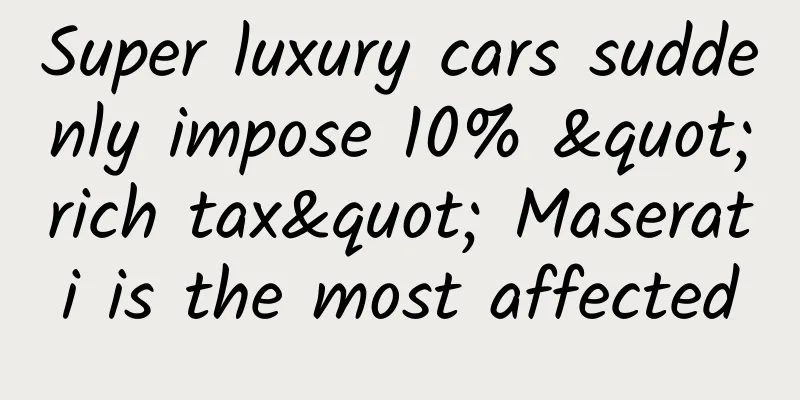Super luxury cars suddenly impose 10% "rich tax" Maserati is the most affected

|
According to incomplete statistics, automobile products with a sales price of more than 1.3 million yuan currently sold in China are mainly distributed in the fields of high-performance sports cars, large luxury sedans and large luxury SUVs. On the evening of November 30, the Ministry of Finance and the State Administration of Taxation jointly issued a notice, announcing that from today (December 1), a consumption tax of 10% will be levied at the retail stage on passenger cars and medium and light commercial buses with a retail price of 1.3 million yuan (excluding value-added tax) or more. Regarding the change of the consumption tax collection stage for super luxury cars to the retail stage, Cui Dongshu, secretary-general of the National Passenger Car Market Information Joint Conference, told the Securities Daily reporter that the purpose is to guide consumption reasonably, curb high consumption while increasing fiscal revenue, and explore experience for moving the tax collection stage to the retail stage in the consumption tax reform. The reporter noticed that models with a price of more than 1.3 million yuan are considered super-high-priced luxury cars, and the new taxes are high, which is enough to buy an ordinary luxury mid-size car. As China's economy enters a new normal, the sales of some super-high-priced luxury cars have also entered a downward channel in the past two years. Last year, the representative brand of super-high-priced luxury cars, Maserati, sold 7,500 units in China, a year-on-year decrease of 20%. It can be predicted that the government's increase in consumption tax on ultra-high-priced luxury cars will inevitably further affect the sales of Maserati and other car brands in China. Luxury models are affected to varying degrees According to incomplete statistics, automobile products with a sales price of more than 1.3 million yuan currently sold in China are mainly distributed in the fields of high-performance sports cars, large luxury sedans and large luxury SUVs. The models that need to increase taxes include Maserati, Bentley, Rolls-Royce and Lamborghini. Data shows that in 2015, the sales of Maserati, Bentley, Rolls-Royce and Lamborghini were 7,500, 1,615, 500 and 278 respectively. Maserati, the sales leader of the above-mentioned car brands that are subject to tax increases, may be hit the hardest. In 2015, Maserati's sales in China accounted for 23% of its global sales, with cumulative sales of about 7,500 vehicles, a year-on-year decrease of 20%. Previously, Maserati planned to achieve global sales of 50,000 vehicles in 2015. The sharp decline in performance in China is also one of the factors that affected the global sales volume that did not meet expectations. At this year's Guangzhou Auto Show, Maserati China Sales Director Gao Mengxiong said that Maserati has achieved the sales target set at the beginning of the year, and next year's sales will definitely increase compared to this year. As the country raises the consumption tax, it remains unknown whether Maserati's sales next year can meet expectations. The person in charge of the marketing department of a car company told reporters that for the imported car market, super luxury cars priced above 1.3 million yuan account for a small proportion, and for consumers of super luxury cars priced above 1.3 million yuan, they will not be too sensitive to price changes. Nevertheless, "due to the high unit price of super luxury models priced above 1.3 million yuan, the new policy will cause some inventory pressure and financial pressure on dealers." The above-mentioned person in charge told reporters. According to the latest statistics from the China Automobile Dealers Association, in October this year, the inventory coefficient of imported brands was 1.63, an increase of 38% month-on-month. In the view of industry insiders, the 10% increase in consumption tax on super luxury cars will increase the already heavy operating pressure on imported car dealers in the short term, and the difficulty of adjusting the supply and demand in the imported car market may be further increased. The first stop of consumption tax reform Consumption tax reform is an important part of this round of fiscal and tax reform. The expansion of consumption tax has also become a consensus in the industry. Regarding the change of the consumption tax collection link of super luxury cars to the retail link, Cui Dongshu believes that the advantage is that the tax can be levied on the final selling price of the goods, the tax base is significantly expanded, and it will increase fiscal revenue while playing a role in reasonably guiding consumption. But the disadvantage is that the collection and management is difficult. This time, the relevant departments chose luxury cars as a breakthrough point because the number of 4S retail stores in China is relatively small compared to tobacco and alcohol retail stores, and they are easy to control. This will provide experience for the next stage of the transfer of other tax collection links. Cui Dongshu believes that if the automobile consumption tax is changed to a local tax, local governments will pay more attention to automobile consumption. "For example, when smog is mentioned, the first thing that local governments will do is to impose purchase restrictions. If the tax is levied at the retail level, local governments will have a profit in the automobile consumption stage and will inevitably be more cautious about implementing car purchase restrictions." At the same time, he also believes that changing the consumption tax to the retail stage will help break the local protection in the field of new energy vehicles. At present, the catalogs of new energy vehicles in various places are different because local governments protect local car companies. "Regions like Beijing and Shanghai that adopt overprotection will change their attitude if they can benefit from the collection of consumption tax in the future," Cui Dongshu told reporters. As a winner of Toutiao's Qingyun Plan and Baijiahao's Bai+ Plan, the 2019 Baidu Digital Author of the Year, the Baijiahao's Most Popular Author in the Technology Field, the 2019 Sogou Technology and Culture Author, and the 2021 Baijiahao Quarterly Influential Creator, he has won many awards, including the 2013 Sohu Best Industry Media Person, the 2015 China New Media Entrepreneurship Competition Beijing Third Place, the 2015 Guangmang Experience Award, the 2015 China New Media Entrepreneurship Competition Finals Third Place, and the 2018 Baidu Dynamic Annual Powerful Celebrity. |
<<: Nissan's new car will launch maintenance reminder function to test car networking
>>: All-new Lexus LS spy photos revealed, debut in early 2017
Recommend
150 years of exploration has created the "Gold-touching legend", niobium (ní) is really amazing!
The Chinese Academy of Sciences and the Qinghai P...
Musk warms up: Tesla Autopilot price will increase by $1,000 from November
Recently, Tesla CEO Elon Musk said on Twitter tha...
Zhang Shaozhong's "Suddenly Knowing the War" Collection of Five Seasons - Encyclopedic Military Science Short Video
Zhang Shaozhong's "Suddenly Knowing the ...
Publicizing BOM prices is the best marketing position for latecomer LeEco
The LeEco mobile phone launch held on April 14 ma...
Can anesthesia harm the brain? Is local anesthesia better than general anesthesia? The doctor tells the truth...
Expert of this article: Zhang Zhijian, Master of ...
Apple is also using "hunger marketing" to replace batteries. It has entered "menopause"
On December 9, Apple's vice president of glob...
Xinzhi Short Video Training 0615 Course: Xinzhi has developed a new method to solve the problem of inappropriate public disclosure on Douyin, which can solve 99.99% of the problems inappropriate public disclosure.
Xinzhi Short Video Training 0615 Course: Xinzhi h...
45° Angle Law: The unspoken rules of brand, platform and IP
There are always various unspoken rules in the wo...
Is it expensive to produce the Yongzhou Glasses Mini Program? Yongzhou glasses applet production cost
The factors affecting the quotation of Yongzhou G...
iOS 16.6.1 official version is released, it is recommended to upgrade!
This morning, Apple pushed the official version o...
How to write the Double 12 event plan? This universal solution is for you!
It feels like everyone is busy and exhausted from...
The growth caused by one sentence of copywriting and the logical code behind it
Sometimes a piece of copy can achieve unexpected ...
WeChat bans XiaoIce, Microsoft's mobile Internet surprise fails
[[127934]] On May 29, Microsoft launched its prod...
China's Sky Survey Telescope is here! What can it "survey" and how powerful is it?
On April 29, 2021, the launch of the Tianhe core ...
Wuhan University: The dormitory with cholera cases is no longer sealed! Virulence gene is negative, so why does it still cause disease?
According to the official Weibo of Wuhan Universi...









